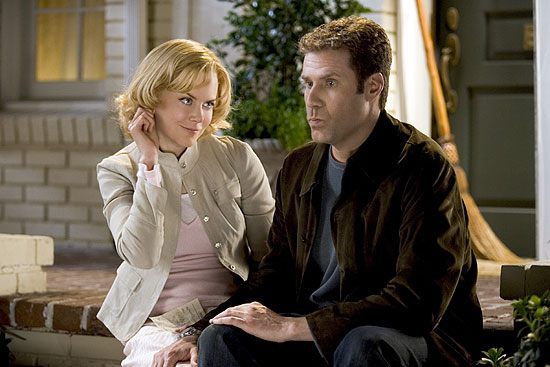
The publications love the satire, writing, cinematography, editing and Asia Argento. Read on...
Hollywood Reporter says:
Bottom line: With George A. Romero taking back the reins, his "Dead" walk again to chillingly thoughtful effect.
After having to sit back and watch others remake his zombie classics -- minus any of the trademark sociopolitical subtext -- George A. Romero has returned to the land of the dead for the first time in two decades, and it's quite evident the godfather of the modern horror film still has much on his mind.
Receiving its world premiere at the CineVegas Film Festival, "Land of the Dead" is the fourth movie in what was originally a trilogy, beginning with 1968's seminal "Night of the Living Dead," the movie that has inspired a couple of generations of filmmakers.
The latest installment could well be Romero's masterpiece. Taking full advantage of state-of-the-art makeup and visual effects, he has a more vivid canvas at his disposal, not to mention two decades worth of pent-up observations about American society.
Even those walking dead have learned a thing or two in the interim.
Romero's legion of fans as well as those who like an allegory with the emphasis on the gory will likely show their appreciation by stalking the theaters in droves, giving Universal a very lively opening weekend, while enthusiastic word-of-mouth could give those zombies some legs.
Having staggered their way through "Dawn of the Dead" and "Day of the Dead," it's apparent those ever-growing masses of "walkers" have started to develop an appetite for more than just fresh flesh.
Following the grunting lead of Big Daddy (Eugene Clark), an imposing gas station attendant, the living dead have begun to sort of re-enact their once-normal lives prior to their affliction.
Meanwhile, the remaining affluent and powerful among the living have fortified themselves in an ivory tower -- a luxury complex called Fiddler's Green, which effectively looks down upon the less fortunate of the city's inhabitants who struggle to survive in the dangerous streets.
It's all the domain of the powerful Kaufman (Dennis Hopper), a slick CEO who keeps himself sequestered in the Green while hiring a group of mercenaries, led by Riley (Simon Baker) and his second-in-command, Cholo (John Leguizamo), to run retrieval missions beyond the electrified fences for luxury items.
But even as they plow their way through the armies of "stenches" in a massive armored vehicle called Dead Reckoning, there's an unstoppable unrest brewing among the dead and the living alike that's about to reach a boiling point.
Although Romero ventured outside his native Pittsburgh to shoot this one in Toronto, it's very clear, from the flag-waving vigilantes to the anti-terrorist rhetoric spewed by Hopper's big-money operator, that most criticisms are being leveled due south of the border.
But those familiar with Romero's work know that doesn't mean they're in for a Michael Moore diatribe. The horror show is still the main attraction, and "Land of the Dead" delivers the goods in harrowing, visceral heaps.
Bolstered by a talented cast that also includes Asia Argento as a tough cookie ex-hooker who joins Baker's entourage, the film never skimps on atmosphere, which at times verges on the horrifically poetic.
Adding to the uncompromising effect is Miroslaw Baszak's night-drenched cinematography, Michael Doherty's tight edit and a pulse-pounding score by Reinhold Heil and Johnny Klimek.

From Variety:
George A. Romero shows 'em how it's done in "Land of the Dead," resurrecting his legendary franchise with top-flight visuals, terrific genre smarts and tantalizing layers of implication. Nerve-shredding fourth installment may not fully reclaim the visceral or satirical impact of the writer-director's 1978 masterpiece "Dawn of the Dead," but it's still a satisfyingly splattery feast of guts and ideas. Though Universal isn't flogging it half as aggressively as last year's "Dawn" remake, pic should grope its way to killer B.O. with no small help from Romero cultists, whose devotion will be nothing short of zombielike.
The horror maestro has come a long way since the third film in the cycle, 1985's "Day of the Dead," and an even longer way since his seminal 1968 classic "Night of the Living Dead." This time around, Romero is playing with bigger stars and a higher (though still modest) budget of about $15 million, as well as a new shooting location (Toronto, instead of his native Pittsburgh).
That said, "Land" is a tour de force of not only independent filmmaking but independent thinking, rigorously worked out on all craft and technical levels yet enlivened by its twisted engagement with the real world.
Romero's apocalyptic vision of an earth beset by endlessly self-perpetuating flesh-eaters remains as relevant and resonant as ever, and this time he's even injected some not-so-subtle political invective into the proceedings. At one point Kaufman, a corrupt, gray-haired city official, declares, "We don't negotiate with terrorists," making this the second actioner in recent months, after "Star Wars: Episode III -- Revenge of the Sith," to lob a grenade in the direction of the White House.
The city in question is one of humankind's last remaining holdouts, an island metropolis surrounded by water and electric fences that keep out the walking undead. Perched in a high tower that dominates the skyline, Kaufman (Dennis Hopper, his brow furrowed with self-entitlement) owns everything and everyone in the exclusive community of Fiddler's Green, advertised as the place "where life goes on," and where upper-class citizens are admitted only via waiting list. Those still outside on the streets, meanwhile, are in the early stages of revolution.
Cholo, one of several soldiers sent out on rescue missions to bring back food and supplies, sets things in motion when Kaufman refuses to let him move into Fiddler's Green. The disgruntled mercenary (a hot-headed John Leguizamo) promptly hijacks Dead Reckoning, an armored military vehicle that holds enough firepower to bomb out the city, which he threatens to do unless Kaufman meets his demands.
In response, Kaufman commissions Cholo's superior Riley (Simon Baker) to recover the stolen tank, accompanied by sharpshooter sidekick Charlie (Robert Joy) and gold-hearted hooker Slack (Asia Argento, putting a tough-talking spin on a familiar role).
Tension between Riley and Cholo, effectively fleshed out by Baker and especially Leguizamo, reps only one of the story's intriguing contrasts. Both guys want out of a nightmare situation, but where Riley hopes to start over away from civilization, social-climbing Cholo wants to retreat inside, into the ranks of the city's elite.
Romero clearly has a lot on his mind, working through issues of class, segregation, individualism and personal responsibility. As always, the scenario eerily and amusingly mirrors the times: Astute viewers will laugh at how the undead phenomenon has already become commercial fodder in the form of theme-park-style attractions and bloodsports. More chillingly, the gleaming facade of Fiddler's Green implies an entire nation struggling and failing to lead normal lives in a war zone, turning against itself in the process.
Most suggestive of all are the zombies themselves, who have become frighteningly resourceful and smart, having learned to communicate as well as use tools and weapons. Unlike the trendy, fast-moving denizens of the recent "Dawn" redux and "28 Days Later," Romero's walkers still shamble along slowly, yet with an increasingly purposeful gait that makes them seem all the more human. They also look more realistically undead than ever, thanks to pic's ace makeup team (led by Greg Nicotero) and special contact lenses that lend their eyes a bluish, otherworldly glaze.
Pic's ideas about continual evolution and advancement extend equally to the carnage, which for most auds will be "Land's" ultimate test. And Romero rises to the occasion with a mastery, discipline and gleeful sense of invention that shows just how far a slim budget can go given the right sensibility. Fans of the trademark spewing, sausage-like intestines will be quite appeased; few will be prepared for the semi-decapitated zombie (emphasis on semi) or the ugly disadvantages of having a pierced navel (you've been warned).
Romero has a way of at once honoring and updating modern horror-pic conventions, relying more here on shock cuts (with super-sharp editing by Michael Doherty) and surprise zombie ambushes than the queasy claustrophobia that pervaded "Night" and "Dawn." The upshot, happily, is a similarly blissful sense of unease.
Miroslaw Baszak's nuanced lensing, finding endless varieties in a predominantly gray palette, accentuates Arvinder Grewal's chilly production design at every turn. Reinhold Heil and Johnny Klimek's score is serviceably grim, with repeated patterns that evoke the restless walk of the damned.
 Here's some movie news that will surprise no one:
Here's some movie news that will surprise no one:
 Anne Hathaway has signed on to star opposite Meryl Streep in The Devil Wears Prada. Hathaway plays small town girl/recent Brown University grad Andrea Sachs who gets her dream job working for a top magazine, a job that turns into a nightmare because of her bitch of a boss, Miranda Presley (Streep.) Prada is based on the book by Lauren Weisberger, while Aline Brosh McKenna is the screenwriter and David Frankel the director.
Anne Hathaway has signed on to star opposite Meryl Streep in The Devil Wears Prada. Hathaway plays small town girl/recent Brown University grad Andrea Sachs who gets her dream job working for a top magazine, a job that turns into a nightmare because of her bitch of a boss, Miranda Presley (Streep.) Prada is based on the book by Lauren Weisberger, while Aline Brosh McKenna is the screenwriter and David Frankel the director. 






 The publications love the satire, writing, cinematography, editing and Asia Argento. Read on...
The publications love the satire, writing, cinematography, editing and Asia Argento. Read on...








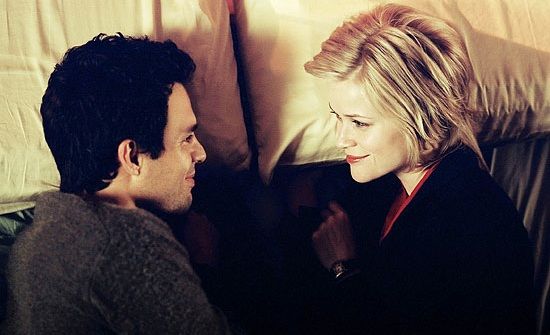

 Some of you venturing out this weekend to see Mr & Mrs Smith shall get a treat. No, I'm not talking about an eyeful of Brangelina. Though, there's no doubt that's a tasty treat. The In Her Shoes trailer will be on most prints of the film. Damn it. I should have figured this. I actually did. But with the hype surrounding the film and that no new trailers had premiered, I just figured Fox would hold the trailer off till Fantastic Four. Anywho, the Cameron Diaz-Toni Collette-Curtis Hanson film's trailer debuted on Entertainment Tonight and I wasn't there for it, so it should be online within the next few days. In two weeks, In Her Shoes will become my 2nd most anticipated film of 2005 after Land of the Dead and Bewitched have opened. :-)
Some of you venturing out this weekend to see Mr & Mrs Smith shall get a treat. No, I'm not talking about an eyeful of Brangelina. Though, there's no doubt that's a tasty treat. The In Her Shoes trailer will be on most prints of the film. Damn it. I should have figured this. I actually did. But with the hype surrounding the film and that no new trailers had premiered, I just figured Fox would hold the trailer off till Fantastic Four. Anywho, the Cameron Diaz-Toni Collette-Curtis Hanson film's trailer debuted on Entertainment Tonight and I wasn't there for it, so it should be online within the next few days. In two weeks, In Her Shoes will become my 2nd most anticipated film of 2005 after Land of the Dead and Bewitched have opened. :-)
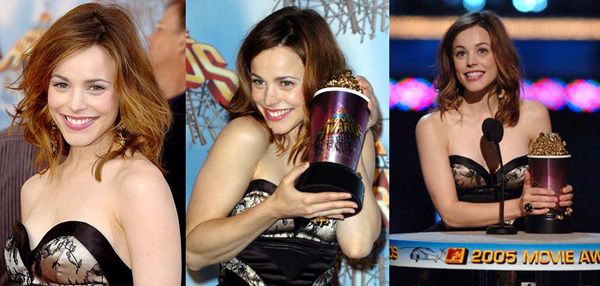
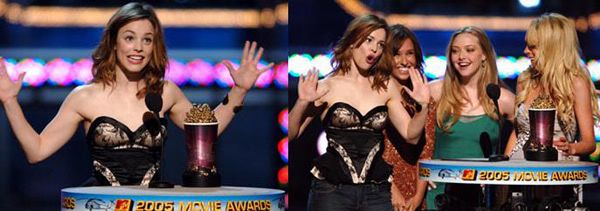
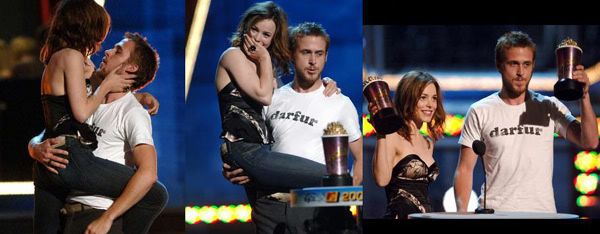

 George A. Romero's Land of the Dead:
George A. Romero's Land of the Dead:
 I'd be an ass not to include Nicole Kidman's other bewitching film Practical Magic. The film was mostly scorned by critics and audiences when released in 1998, but it's a surprisingly enchanting tale of outcast sisters and their magical abilities. I prefer it to the more kooky The Witches of Eastwick. Magic may be a slight mess of the tones, but somehow it worked for me. For the hilarious Mr. Ferrell, don't miss Elf. Director Nora Ephron is most famously known for cowriting When Harry Met Sally and directing Sleepless In Seattle, but I prefer You've Got Mail. That film has grown on me and I watch it every time it's on television.
I'd be an ass not to include Nicole Kidman's other bewitching film Practical Magic. The film was mostly scorned by critics and audiences when released in 1998, but it's a surprisingly enchanting tale of outcast sisters and their magical abilities. I prefer it to the more kooky The Witches of Eastwick. Magic may be a slight mess of the tones, but somehow it worked for me. For the hilarious Mr. Ferrell, don't miss Elf. Director Nora Ephron is most famously known for cowriting When Harry Met Sally and directing Sleepless In Seattle, but I prefer You've Got Mail. That film has grown on me and I watch it every time it's on television.
